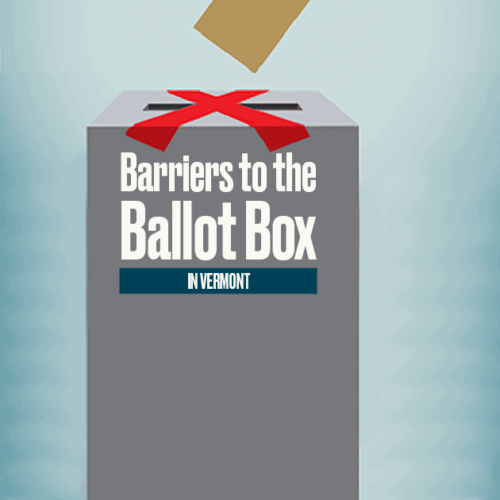Introduction
Vermont has gone farther than almost any other state this year in making sure that residents can vote safely during the COVID-19 pandemic, temporarily switching to a universal vote-by-mail system in which every registered voter is sent a ballot.
And there are few other barriers to voting in the state. For example, Vermont is joined only by Maine and Washington, D.C., in placing zero restrictions on voting by people who have been convicted of a crime, including while they’re in prison.
Sign up for The Moment newsletter
Our CEO Susan Smith Richardson guides you through conversations and context on race and inequality.
Still, advocates are pushing for the state to be more proactive and transparent about voting by prisoners, and for the mail voting expansion to become permanent.
Here’s a look at the state’s efforts to expand voting rights and access in the state:
Vote by mail
Vermont’s temporary transition to mail ballots “was not totally smooth sailing,” said James Lyall, executive director of the Vermont American Civil Liberties Union. “But it’s happening. We have universal mail-in voting.”
He said it’s dramatically increasing participation in the electoral process. He hopes lawmakers will make it a regular feature of elections.
When the state started quarantining due to COVID-19, Vermont Secretary of State Jim Condos, a Democrat, proposed a switch to universal vote-by-mail in which every registered voter would be mailed a ballot for both the August primary and November general election.
Republican Gov. Phil Scott balked at the plan, but the Vermont legislature voted overwhelmingly to authorize Condos to move forward. Scott let the measure become law without his signature.
Republicans sued, claiming that the state’s voter registration records aren’t adequately kept up-to-date — a condition that they say could lead to voter fraud if every name on the list was sent a ballot. State officials pointed to the five other U.S. states that vote almost exclusively by mail with no evidence of fraud, and a federal judge dismissed the suit.
Access in prison
While lawmakers in Florida are standing in the way of a citizen initiative to restore voting rights to people with past felony convictions by enacting what some have called a modern-day poll tax, Vermont stands out in granting voting rights to any citizen, regardless of criminal record or imprisonment.
But Lyall said “there’s more work to be done to make sure that people actually are able to access that right.”
“It’s hard to say how that plays out in practice, what efforts the Department of Corrections makes to make sure that incarcerated people get to vote. The Department of Corrections is not particularly transparent or trustworthy when it comes to internal operations,” he said. “That’s a question mark, or area of potential improvement. I don’t think many people outside the Department of Corrections really have a handle on what that looks like in practice.”
Vermont Department of Corrections spokesperson Rachel Feldman said that staff is dedicated to helping inmates vote each election cycle.
“COVID has presented unique challenges this election cycle. One such challenge is bringing in outside non-partisan groups that usually conduct in-person voter registration sessions – such as League of Women Voters and Disability Rights Vermont,” she said. “This year, Vermont DOC found new ways to work with these groups to get information into people’s hands and facilitate delivery of information, in both written and video form.”
Feldman said that the state does not track, “nor would it release,” information about the number of ballots cast by prisoners, and she noted that ballots are attributed to an inmate’s last address, not the address of the prison.
Proactive measures
Lyall would like to see Election Day become a state holiday, especially if universal vote by mail goes away after this year. Otherwise, he said, “it’s a barrier to a lot of working people.”
He’d also like to see the state be more proactive in helping the naturalized citizens in a refugee community in the Burlington area navigate language barriers in voting, and for the state to do more to make sure voting is accessible to people with disabilities.
But he recognizes that Vermont is in a great place to be talking about these issues, compared with what’s happening in other parts of the U.S.
“We’re not seeing all the same challenges that some of our colleagues around the country are facing, where you have very extreme forms of voter suppression and efforts to disenfranchise huge numbers of people as an electoral strategy,” Lyall said. “As to voting rights, Vermont is definitely one of the better states in the nation.”
Read more in Money and Democracy
US Polling Places
In Alabama, a long history of suppressing Black votes continues
The fight over absentee ballots, poor outreach and lax management sow confusion.
US Polling Places
Clerical woes could present problems for rural Alaska voters
Witness signatures won’t be required on mail-in ballots for the 2020 general election.


Join the conversation
Show Comments